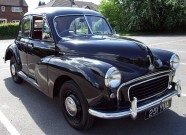Can the MMOC "preserving the use of our Minor" survive this one?
Petrol and diesel ban by 2040
Forum rules
By using this site, you agree to our rules. Please see: Terms of Use
By using this site, you agree to our rules. Please see: Terms of Use
-
Dean
- Minor Legend
- Posts: 2180
- Joined: Fri May 30, 2008 9:41 pm
- Location: Sutton Coldfield
- MMOC Member: No
Petrol and diesel ban by 2040
http://www.bbc.co.uk/news/uk-40723581
Can the MMOC "preserving the use of our Minor" survive this one?

Can the MMOC "preserving the use of our Minor" survive this one?
My Minor:
A Clarendon Grey 1953 4 Door Series II.
MMOC - 66535

A Clarendon Grey 1953 4 Door Series II.
MMOC - 66535
-
greendefender123
- Minor Addict
- Posts: 762
- Joined: Mon Jul 27, 2015 6:10 pm
- Location: Brompton Regis nrDulverton
- MMOC Member: No
Re: Petrol and diesel ban by 2040
Its banning the sale of new petrol and diesel cars. My landy and moggie will still be going strong! Il continue to drive my diesel astra which is great for power and economy but I can't see it lasting more than 4-5 years. Alot could happen in the next 23 years. Petrol and diesel cars being phased out shouldn't cause anyone any problems in the short term. I don't care anyway.
-
Dean
- Minor Legend
- Posts: 2180
- Joined: Fri May 30, 2008 9:41 pm
- Location: Sutton Coldfield
- MMOC Member: No
Re: Petrol and diesel ban by 2040
But to run a minor, you need someone to refine the oil into petrol. It is some time away, but it could be our younger members still in their teens will struggle to get petrol by the time they hit 50yrs of age.
My Minor:
A Clarendon Grey 1953 4 Door Series II.
MMOC - 66535

A Clarendon Grey 1953 4 Door Series II.
MMOC - 66535
-
greendefender123
- Minor Addict
- Posts: 762
- Joined: Mon Jul 27, 2015 6:10 pm
- Location: Brompton Regis nrDulverton
- MMOC Member: No
Re: Petrol and diesel ban by 2040
I very much doubt they'll stop producing petrol and diesel fuel. Tho the landy will run on sunflower oil so that's halved my problem.
- Monty-4
- Minor Addict
- Posts: 699
- Joined: Sun Oct 26, 2014 7:17 pm
- Location: Gloucestershire
- MMOC Member: Yes
Re: Petrol and diesel ban by 2040
There are already a few companies and individuals in the UK doing electric conversions. The price just needs to come down! 
68' 4-door Saloon, another 'Monty'.
-
SteveClem
- Minor Legend
- Posts: 1904
- Joined: Sun Jul 03, 2011 11:37 am
- Location: Near Belper
- MMOC Member: Yes
Re: Petrol and diesel ban by 2040
There are colossal issues to resolve if government is serious about this. Technology,infrastructure,cost etc etc. Providing all the necessary electricity required will be a challenge. 
-
Dean
- Minor Legend
- Posts: 2180
- Joined: Fri May 30, 2008 9:41 pm
- Location: Sutton Coldfield
- MMOC Member: No
Re: Petrol and diesel ban by 2040
I agree. Currently we pay quite a bit of tax on the stuff we put into our cars. How is the inland revenue going to recover tax on the electric you put into your car without hitting your normal house hold running costs. Perhaps the yearly road tax will have to change yet again. Then as you suggest Steve, there's the question can the UK generate and import enough electricity!
My Minor:
A Clarendon Grey 1953 4 Door Series II.
MMOC - 66535

A Clarendon Grey 1953 4 Door Series II.
MMOC - 66535
Re: Petrol and diesel ban by 2040
I don't believe the use of oil products will stop entirely, the problem will be more around the loss of mainstream demand so distribution and filling stations as we know them now may not continue. Perhaps we can go back to buying petrol in two gallon cans as they did before petrol pumps were introduced in the 1920s. If its not available at all we may have to blend our own fuel using such flammable liquids as are available.
I believe steam railways have similar difficulty getting suitable grades of coal, once commonplace but now little used.
I believe steam railways have similar difficulty getting suitable grades of coal, once commonplace but now little used.
-
Sleeper
- Minor Legend
- Posts: 1183
- Joined: Tue Nov 08, 2016 3:18 pm
- Location: Manchester ( Damp and Miserable ) and that's just the wife...
- MMOC Member: Yes
Re: Petrol and diesel ban by 2040
23 Years?....hands up those who will still be living/driving in 23 years.
John
John
Re: Petrol and diesel ban by 2040
I think the problem will not be the abrupt 23 year cutoff but rather a gradual diminution of combustion engine use in the face of improved alternatives and official discouragement. If they start diesel charging zones the next step could well be 'no ic vehicle 'zones.
Already my nearest filling station is five miles away.
Already my nearest filling station is five miles away.
-
palacebear
- Minor Legend
- Posts: 2953
- Joined: Mon May 16, 2016 4:39 pm
- Location: Kidderminster, Worcestershire.
- MMOC Member: Yes
Re: Petrol and diesel ban by 2040
Don't forget this is already happening in London. The Low Emissions Zone (not to be confused with the congestion charge zone) covers approximately a 15 mile radius around Westminster and already prohibits older diesel vehicles, mainly those without catalytic convertors, which includes quite new 'grey imports' originally built for the Japanese and australasian markets. Entering the zone in such a vehicle attracts a £100 daily charge. London's bus fleet now undergoes continual renewal. Euro-2 diesel buses are now prohibited. Euro-3 buses will soon be phased out. Euro-4 buses are still permitted but Euro-4/electric hybrids or hydrogen-powered are the current way forward. Even the few remaining Routemasters employed on tourist services have been retro-fitted with Iveco Euro-4 engines, despite their being over 50 years old. Plans are also afoot to ban older petrol vehicles from the zone, although the qualifying criteria hasn't been formalised yet.
1956 4-door called Max
-
Trickydicky
- Minor Legend
- Posts: 1565
- Joined: Fri Aug 05, 2011 9:53 pm
- Location: Leeds, West Yorkshire
- MMOC Member: No
Re: Petrol and diesel ban by 2040
This is a great move in my opinion as it means motor manufactures will have to start to speed up the process of creating "greener" vehicles.
They will now have to start investing in R+D to create them. The potential for new technology's is great and if the government gets it act together and invests in it, it could aid our flagging manufacturing economy.
My concern as already mentioned is how they will recoup the tax presently on fuel if we move to electric and how will manufactures overcome the paltry distances that electric vehicles currently have. Until the latter is addressed we will always have some form of Internal Combustion Engine.
They will now have to start investing in R+D to create them. The potential for new technology's is great and if the government gets it act together and invests in it, it could aid our flagging manufacturing economy.
My concern as already mentioned is how they will recoup the tax presently on fuel if we move to electric and how will manufactures overcome the paltry distances that electric vehicles currently have. Until the latter is addressed we will always have some form of Internal Combustion Engine.
Richard
Opinions are like people,everyone can be different.
Opinions are like people,everyone can be different.
-
SteveClem
- Minor Legend
- Posts: 1904
- Joined: Sun Jul 03, 2011 11:37 am
- Location: Near Belper
- MMOC Member: Yes
Re: Petrol and diesel ban by 2040
The theory is great, the technology is getting there, the practicalities and cost will be horrendous,the political problems such as recouping tax losses...hmmm.
This looks like a classic case of passing problems onto the next generation.
This looks like a classic case of passing problems onto the next generation.
-
Budgie
- Minor Addict
- Posts: 722
- Joined: Sun Nov 29, 2009 7:10 pm
- Location: south wales
- MMOC Member: Yes
Re: Petrol and diesel ban by 2040
The loss of manufacturing jobs for petrol and diesel vehicles in Wales alone runs into in excess of 18000 ! They can't get the economy right in the last decade leave alone reinvent the car. As mentioned earlier, the infrastructure would need to be taken into account and I feel that it would take longer than the phasing out of the internal combustion engine.
Re: Petrol and diesel ban by 2040
it will never happen, there will be so many gov changes one will promise to abandon the idea and all the classic car owners,old petrol and diesel car owners,bus companies ,lorry drivers ,van delivery drivers ,diesel train owners ,taxi drivers ,farmers with tractors ,grass cutters etc etc will register at home address and at place of work and get two votes ,the new party will get in ,and then back track and say they will introduce it in another 20 years,or when the oil reserves have run out. Its also a fact that electric cars are heavier than a comparable size of conventional .due to the large battery ,and put more particles into the air from rubber as the tyres wear faster so perhaps electric hover cars will be the next bandwagon politicians jump on
-
mowogg
- Minor Fan
- Posts: 412
- Joined: Mon Oct 22, 2007 9:45 pm
- Location: Chichester West Sussex
- MMOC Member: No
Re: Petrol and diesel ban by 2040
I think you will see progressive restrictions on older cars and vehicles over the next few years particulaly in built up areas and on week days. I could well imagine these restrictions could come in over the next 5 years.
Suggest we use our cars while we can
Suggest we use our cars while we can
Re: Petrol and diesel ban by 2040
I like the idea of transmitting electricity in the same manner as radio waves. You could recharge on the go. Each conductor would have to be sent separately of course. 
-
Smithy1961
- Minor Fan
- Posts: 147
- Joined: Thu Nov 10, 2016 9:02 am
- MMOC Member: Yes
Re: Petrol and diesel ban by 2040
The big step is transmitting in roads ,
Motorways will be retrofitted with charging lanes .
The biggest hold back is range so intercity roads will recharge your vechicle as you drive. this tech is already here ,
Motorways will be retrofitted with charging lanes .
The biggest hold back is range so intercity roads will recharge your vechicle as you drive. this tech is already here ,
-
amgrave
- Minor Addict
- Posts: 985
- Joined: Mon May 26, 2014 3:26 pm
- Location: North Kent
- MMOC Member: No
Re: Petrol and diesel ban by 2040
That's already been invented, it's called Scalelectric. Just need to make it bigger 


-
palacebear
- Minor Legend
- Posts: 2953
- Joined: Mon May 16, 2016 4:39 pm
- Location: Kidderminster, Worcestershire.
- MMOC Member: Yes
Re: Petrol and diesel ban by 2040
The slots in the carriageway will be lethal for cyclists... 
1956 4-door called Max